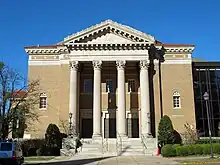| Temple Emanu-El, Birmingham, Alabama | |
|---|---|
 Temple Emanu-El | |
| Religion | |
| Affiliation | Reform Judaism |
| Year consecrated | 1912 |
| Status | Active |
| Location | |
| Location | 2100 Highland Avenue South Birmingham, Alabama 35205 |
| Municipality | Birmingham |
| Territory | Alabama |
| Geographic coordinates | 33°30′01″N 86°47′38″W / 33.5002°N 86.7938°W |
| Architecture | |
| Style | Neoclassical |
| Completed | 1912[1] |
| Website | |
| www | |
Temple Emanu-El is a Reform Jewish congregation in Birmingham, Alabama.
History
The community that would become Temple Emanu-El first held Rosh Hashana and Yom Kippur celebrations in 1881. Before the synagogue was built, the community met at the Cumberland Presbyterian Church for the public worship services. Land for the synagogue was purchased in 1884, and construction began in 1886. The building, located on the southeast corner of 5th Avenue North and 17th Street,[1] was inaugurated on January 24, 1889.[2] The temple's founding president and (lay) rabbi was businessman, poet, and humanitarian Samuel Ullman (1840-1924).[3]
Rabbi Morris Newfield, originally from Hungary, led the congregation for 45 years, from 1895 to 1940.[1] The congregation moved to a new sanctuary, at 2100 Highland Avenue South, in 1912.[1]
Rabbi Milton Grafman, one of the signers of "A Call for Unity", led the congregation from 1941 to 1975.[1]
Jonathan Miller was the congregation's rabbi from winter 1991 to summer 2017.[4]
Adam Wright became the congregation's rabbi in July 2019.[5]
See also
References
- 1 2 3 4 5 "Our Spiritual Home: Our Story," Temple Emanu-El, Birmingham, Alamama official website. Accessed September 12, 2018.
- ↑ "Birmingham, Alabama - Merchants Born of Iron and Steel". Encyclopedia of Southern Jewish Communities. Goldring / Woldenberg Institute of Southern Jewish Life. Retrieved 24 September 2013.
- ↑ Saunders, David. "FRANK Z. TEMERSON," Field Guide to Wild American Pulp Artists. Accessed July 15, 2018.
- ↑ "Staff and Leadership". Temple Emanu-El. Retrieved 24 September 2013.
- ↑ "Rabbi teaches New Testament role in Jewish history". al. 2019-07-26. Retrieved 2021-11-25.